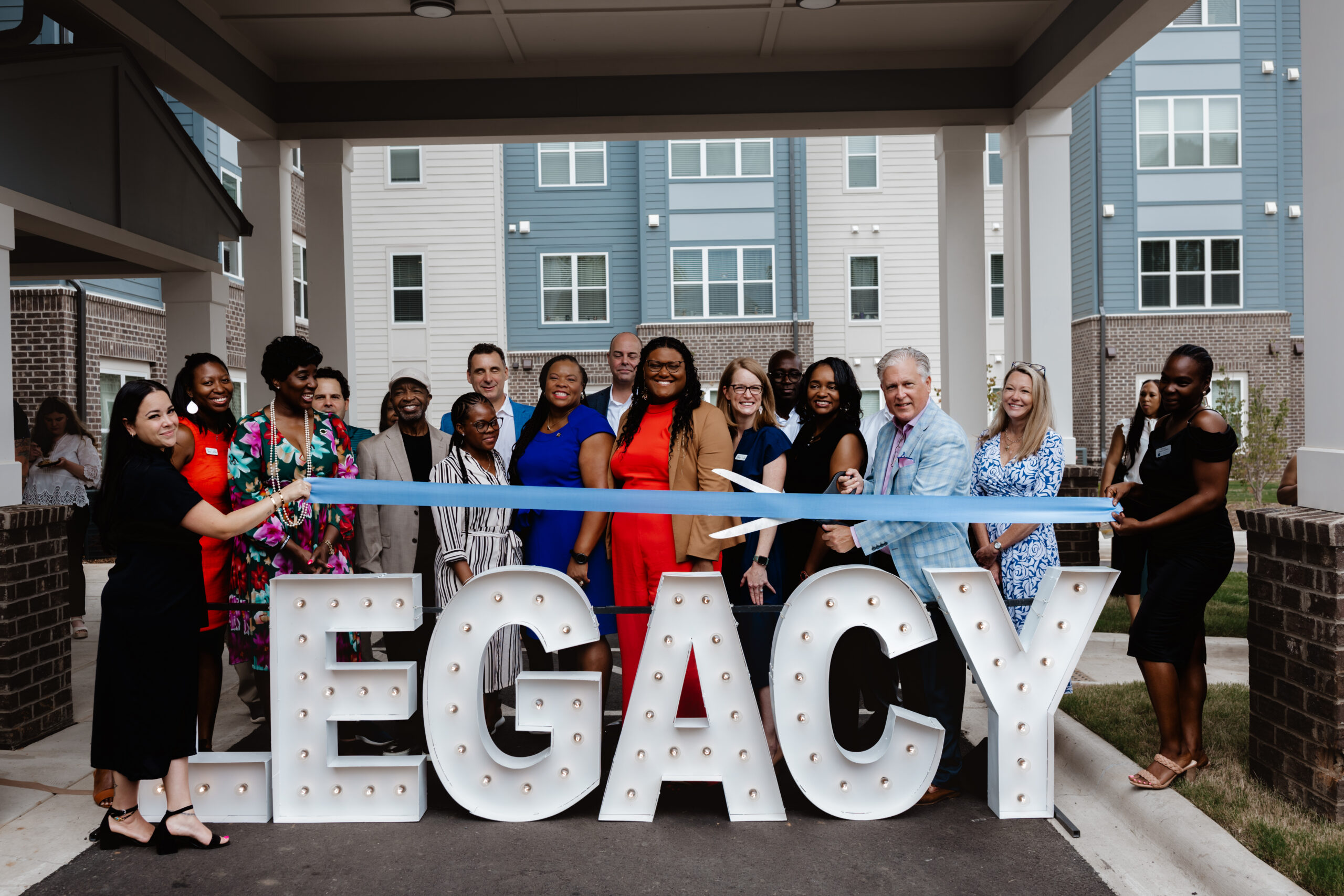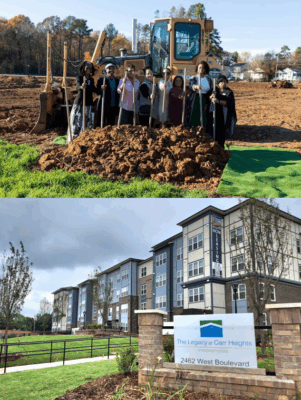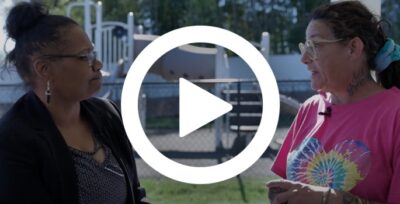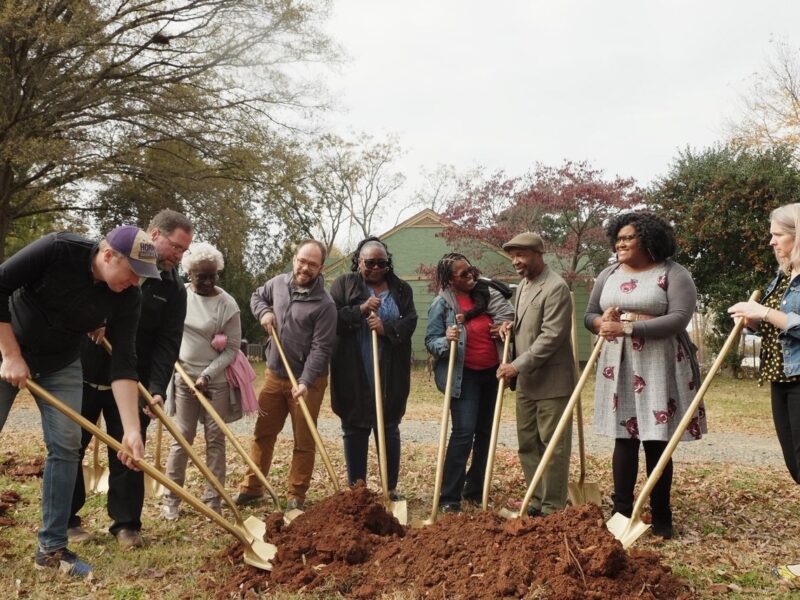
Finding Home, Building Hope
In a city experiencing rapid growth, Charlotte, North Carolina, is facing a deepening challenge: the widening gap between housing costs and what local families can afford. As rents rise and wages struggle to keep pace, a growing number of residents, from pre-K teachers to essential workers, are being pushed to the margins.
To help address this challenge, Foundation For The Carolinas launched the Charlotte Housing Opportunity Investment Fund (CHOIF) in 2019, raising $53 million for this mission driven impact investment vehicle. CHOIF was created to leverage private capital to complement the City of Charlotte’s Housing Trust Fund public dollars, amplifying investment to expand affordable housing across the city.
LISC Fund Management in partnership with LISC Charlotte manages and implements the fund, deploying capital into high-impact housing developments and working closely with community partners and the City to ensure these investments reach those who need them most. Together, CHOIF represents a model public-private partnership — combining philanthropy, civic leadership and community development expertise to take bold, coordinated action on one of Charlotte’s most urgent issues.
Under the leadership of Senior Executive Director Ralphine Caldwell, LISC Charlotte has helped drive the effort forward. Since CHOIF’s launch, the fund has supported the creation or preservation of nearly 2,000 affordable homes and plays a key role in removing longstanding barriers to development. Building on this success, CHOIF II has been launched and is currently in the process of raising capital to continue expanding affordable housing opportunities across the city.
We sat down with Ralphine to explore what affordable housing truly means, how Charlotte is responding to the crisis, and why this work is personal — for her, and for the city.
Q&A with Ralphine Caldwell: Tackling Charlotte’s Affordable Housing Crisis Head-On
Q: Tell us a bit about yourself and your role at LISC Charlotte.
A: I’ve had the privilege of leading LISC Charlotte since its launch in 2019, when we kicked off our first major initiative: the Charlotte Housing Opportunity Investment Fund (CHOIF). Housing and community development have been central to my career and this work is deeply personal to me. When conversations about upward mobility in Charlotte gained urgency in 2019, I saw a chance to be part of a solution that could truly make a difference, and I knew I wanted to help lead that effort.
That fund has exceeded expectations, investing in 14 developments and supporting 1,927 affordable housing units. And because the need hasn’t slowed down, we’re launching a second fund to keep the momentum going. At LISC Charlotte, our work goes beyond housing. We are focused on creating opportunities in the community, through economic growth, small business support and programs that help people thrive. It’s about lifting up people and neighborhoods together and I’m proud to be part of that journey.

Ralphine Caldwell, Senior Executive Director, LISC Charlotte
Q: What exactly is “affordable housing” and who does it serve?
A: Affordable housing refers to housing that costs no more than 30% of a household’s income, including rent or mortgage and utilities. When families are spending more than 30% of their income on housing, they are often forced to cut back on other essentials like food, healthcare or education. This is not just for people living in poverty, because people with important jobs in our city often struggle to find housing they can afford. I am talking about teachers, nurses, first responders, healthcare workers, recent college graduates and retirees. In Charlotte, as costs rise and more people are moving here every day, it is becoming increasingly difficult for people with steady jobs and incomes to live near where they work.
Q: Why is this becoming such a big issue in Charlotte right now?
A: Charlotte is growing fast, with about 115 people moving here every day. But new housing hasn’t kept pace, and wages aren’t rising as quickly as rent. That squeeze is leaving more families, even middle-income earners, priced out of opportunity.
To put that in perspective, the average rent for a three-bedroom apartment in Charlotte is now $2,249 per month or nearly $27,000 per year. Using the standard benchmark that no more than 30% of gross income should go toward rent, a household would need to earn almost $90,000 a year to afford that without being rent-burdened.
Even a two-bedroom apartment, averaging $1,802 per month, would require an annual income of about $72,000 to meet the affordability standard. That’s a stretch for many working families — and it’s why the need for affordable housing options has become so urgent.
Q: What impact does this have on the broader community?
A: It adds strain across the board. Longer commutes, talent shortages for local businesses and increasing wealth gaps. When workers can’t afford to live near their jobs, the whole system begins to fray. Housing is not just about shelter; it is foundational to a thriving city.
Q: What are some common myths about affordable housing?
A: A common myth about affordable housing is that it brings down nearby property values or increases crime. In truth, well-planned, mixed-income affordable housing does neither. According to Enterprise’s Impact of Affordable Housing on Families and Communities Review, it brings stability, workforce retention and a healthier, more thriving economy.
Q: What inspired the creation of CHOIF?
A: A 2014 study ranked Charlotte last among fifty major U.S. cities for upward mobility. It was a wake-up call. Researchers pointed to the lack of affordable housing as a key barrier holding families back. In response, public and private partners came together to launch CHOIF, managed by LISC as a trusted community development partner. It’s a shining example of how cities can take bold, coordinated action.
Q: What does success look like for CHOIF?
A: Success is more than just numbers, it’s about people thriving. By pairing supportive services alongside housing, we offer a holistic approach which allows families and people to thrive. It also means families living near schools, jobs, transit and healthcare. Opportunity without displacement. Kids growing up in stable neighborhoods where they can dream big. Through CHOIF, we’re building on that vision with deeper impact and broader reach and have seen firsthand that families are able to thrive when they are in stable houses in areas with opportunity.
Q: How does the community shape CHOIF’s work?
A: From day one, community voices have been at the center. We work with grassroots groups to identify local priorities and tailor solutions. CHOIF developers have partnered with local nonprofit organizations to embed services for residents across many of our developments to set communities up for success. These include on-site healthcare workers, the “Moms Moving Forward” program in partnership with Freedom Communities and a digital access initiative that provided laptops and digital literacy training to over 1,600 households through partnerships with Barings and E2D. This ground-up engagement ensures CHOIF is accountable to the people it serves, not just the institutions that fund it.
Q: What’s been one of the biggest challenges?
A: Launching a housing fund during a global pandemic definitely was not easy. Supply chain issues and inflation pushed costs up. In response, we streamlined how developers access funding through a “one-stop-shop” application process, in partnership with the City of Charlotte. It helped accelerate deals and provide more opportunities for who gets funded.

Before and after of Legacy at Carr Heights, a CHOIF I development
Today, costs continue to rise and interest rates are up, making it increasingly difficult to raise dollars to deploy.
Q: Can you share a project that reflects CHOIF’s values in action?
A: Evoke Living at Ballantyne is a great example. Ballantyne is one of Charlotte’s most opportunity-rich areas that is out of reach for many. By placing 60 affordable units right in the heart of that neighborhood, we’re creating access to top schools, healthcare and jobs for families who need it most. That’s transformative for these 60 households and families who will live there
Q: What’s next for CHOIF?
A: Our follow-on fund, CHOIF II is already underway, supported by strong institutional partners like Truist Bank, Fifth Third Bank, First Citizens Bank, Ally Bank, Duke Energy and TD Bank. We’re actively continuing to raise funds and deploying capital into impactful deals. The mission remains the same: to continue the work we have already started and meet Charlotte’s growing housing needs with creativity and collaboration.
Q: How can we get involved in this solution?
A: Investing in CHOIF II means investing in Charlotte’s future, so please reach out to me or LISC Charlotte if you are interested in getting involved. Foundations and philanthropists can contribute through grants or program-related investments. Others can advocate for housing policies or support affordable housing developers with technical assistance. Every action counts.
Q: Anything else you’d like to add?
A: Affordable housing isn’t just statistics. It’s about real families staying in their homes, sending their kids to great school and building brighter futures. We’re proud of what CHOIF has accomplished so far, but the need is only growing. With continued support, we can keep building opportunity from the ground up.
Voices from the Community: Lives Transformed by Affordable Housing
Behind every development LISC Charlotte supports are individuals whose lives have been forever changed. Here are just three of their stories. *Some resident names have been changed to maintain confidentiality.
Daria’s Story: A Fresh Start at Abbington at Mount Holly
At 21, Daria was seeking more than a home. She was seeking healing, independence and direction after the challenges of the pandemic. She found all three at Abbington at Mount Holly.
“I learned new things and I was figuring everything out,” she says. “Abbington at Mount Holly staff made it seem like home.”
This apartment became Daria’s next chapter and today, she is thriving, managing operations at her father’s trucking company and dreaming bigger than ever. “One opportunity like this,” she says, “could save somebody’s whole entire life.”
Bridgette’s Journey: A Place to Grow and Belong
Bridgette, a pre-K teacher born and raised in Charlotte, knew it was time for her own space. Abbington Mount Holly offered more than affordability. It gave her a community just 15 minutes from work, and the pride of independence.
“It’s peaceful,” she says. “Being able to walk in your own door and be in your own space. It’s a starter for me. My goal is to eventually own a home.”
For Bridgette, this home is a stepping stone to the future she’s always wanted.
Randy’s Story: From Displacement to Peace of Mind

Randy Byrd in front of his apartment.
After 15 years in Charlotte, Randy suddenly faced homelessness when his apartment building was sold. With help from LISC partners, he secured a unit at Shamrock Gardens just in time.
“I was one day [away] from being homeless,” he recalls. “This means the world to be in my own apartment and be at peace.”
His message to supporters: “I’ve been in that situation. A lot of people don’t have any place to go. I think it’s very important to keep these programs up.” You can hear more about Randy’s story in his testimonial video here.
Through CHOIF, LISC Charlotte is proving that affordable housing development isn’t just possible. It is essential. With leadership from Ralphine Caldwell, strong local partnerships and community-centered solutions, the organization is ensuring that growth in Charlotte doesn’t leave people behind.
Because when you invest in housing, you invest in people. And that changes everything.
Disclaimer:
An investment in a Fund entails a high degree of risk, including the risk of loss. There is no assurance that a fund’s investment objective will be achieved or that investors will receive a return on their capital. Investors must read and understand all the risks described in a fund’s final confidential private placement memorandum and/or the related subscription documents before making a commitment. The recipient also must consult its own legal, accounting and tax advisors as to the legal, business, tax and related matters concerning the information contained in this document to make an independent determination and consequences of a potential investment in a Fund, including US federal, state, local and non-US tax consequences.
PAST PERFORMANCE IS NOT INDICATIVE OF FUTURE RESULTS OR A GUARANTEE OF FUTURE RETURNS. The performance of any portfolio investments discussed in this document is not necessarily indicative of future performance, and you should not assume that investments in the future will be profitable or will equal the performance of past portfolio investments. Investors should consider the content of this document in conjunction with investment fund quarterly reports, financial statements and other disclosures regarding the valuations and performance of the specific investments discussed herein.
The investments discussed do not represent all investments made by CHOIF. It should not be assumed that any of the investments discussed were or will be profitable, or that investments made in the future will be profitable or will equal the performance of the investments discussed herein. In addition, there can be no assurance that future funds will be able to make investments similar to the historic investments presented herein (because of economic conditions, the availability of investment opportunities and otherwise). No discussion with respect to specific companies should be considered a recommendation to purchase or sell any particular investment.
References made to endorsements by any third-party to invest with CHOIF II are not indicative of future performance and does not imply any guaranteed level of service, skill, or training. Investors should not rely on endorsements for any purpose and should conduct their own review prior to investing. None of the individuals quotes in this document are a “promotor” or investor in CHOIF or CHOIF II, and are all third-parties who are not compensated for these statements.





